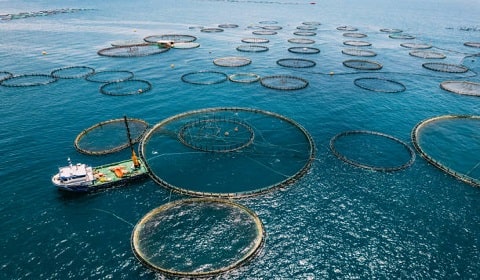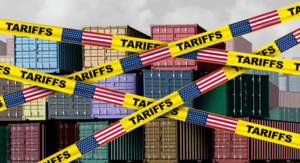
Offshore Fish Farming: A New Wave of Sustainable Aquaculture
Offshore Fish Farming, an innovative aquaculture practice, extends beyond coastal waters, harnessing the vastness of the open ocean to cultivate fish. This method diversifies into two primary types: submersible net pens and floating cages, each tailored to various species and environmental conditions.
It holds immense scope for sustainable seafood production, aiming to meet global demand while reducing pressure on wild fish populations. By situating farms in deeper, more nutrient-rich waters, offshore farming promises improved fish health and growth rates.
The importance of this practice lies not only in bolstering food security but also in its potential to restore overfished areas, making it a pivotal strategy for future aquaculture expansion.
Offshore Fish Farming
Offshore fish farming, a burgeoning solution to surging seafood demand, counters traditional aquaculture’s ecological toll. Cultivating fish in vast floating platforms amidst open ocean waters offers both promise and complexity. These innovative systems mitigate environmental degradation while meeting consumer needs.
Yet, challenges abound, including technological hurdles, environmental risks, and regulatory concerns. Despite obstacles, offshore aquaculture stands as a beacon of sustainable seafood production, harnessing the vast potential of oceanic resources to nourish a growing global populace.
Let’s delve into the key aspects of this burgeoning industry in five points.
Table of Contents
1. Addressing Food Security and Demand
The global population is expected to reach 9.7 billion by 2050, driving the demand for protein-rich foods such as fish. According to the Food and Agriculture Organization (FAO), aquaculture is the fastest-growing food production sector, providing nearly half of the world’s fish supply for human consumption.
However, traditional aquaculture methods face constraints such as limited space, competition for coastal areas, and environmental degradation. Offshore fish farming offers a viable solution by utilizing vast expanses of open ocean waters, thus increasing production capacity to meet the rising demand for seafood.
Read More: Green Hydrogen Development in Africa
2. Environmental Sustainability
Offshore fish farming holds the potential to reduce the environmental impact associated with coastal aquaculture. By moving fish farms offshore, concerns related to eutrophication, habitat destruction, and disease transmission can be minimized. Additionally, offshore sites benefit from strong water currents that naturally disperse waste, preventing the buildup of pollutants.
The deeper waters of the open ocean offer a more stable environment, reducing the risk of algal blooms and oxygen depletion commonly observed in shallow coastal areas. According to Aquaculture Environment Interactions, offshore aquaculture systems have the potential to reduce nutrient loading in coastal waters by up to 75%, thereby enhancing overall water quality and ecosystem health.
Read More: Food Security and Development in Africa
3. Technological Advancements
The success of offshore fish farming hinges on technological innovations that enable efficient and sustainable operations in challenging marine environments. Advanced engineering techniques are employed to design and construct robust floating platforms capable of withstanding harsh weather conditions and ocean currents.
These platforms are equipped with state-of-the-art monitoring systems that track environmental parameters, fish behavior, and feeding patterns in real-time.
Advancements in fish nutrition and genetics have led to the development of species-specific feeds and selective breeding programs, enhancing growth rates and disease resistance.
Automation and remote sensing technologies streamline farm management tasks, reducing labor costs and minimizing the need for human intervention. The adoption of advanced technologies has resulted in a 30% increase in offshore fish farming productivity over the past decade.
Read More: Climate-friendly Investments in Developing Countries
4. Economic Opportunities
Offshore fish farming presents lucrative economic opportunities for coastal communities, creating jobs and stimulating economic growth. The establishment of offshore aquaculture operations requires investment in infrastructure, technology, and skilled labor, driving demand across various sectors. Additionally, offshore fish farms contribute to local economies through the purchase of supplies and services from nearby businesses, such as boat manufacturers, feed suppliers, and maintenance contractors.
Offshore aquaculture can alleviate pressure on wild fish stocks by providing a sustainable source of seafood for domestic and international markets. This reduces the reliance on imported fish and strengthens food security while promoting self-sufficiency in seafood production.
According to National Oceanic and Atmospheric Administration (NOAA), the offshore aquaculture industry has the potential to generate billions of dollars in revenue and create thousands of jobs in coastal regions across the globe.
Read More: Impact of Climate Change
5. Regulatory and Environmental Challenges
Despite its potential benefits, offshore fish farming faces regulatory and environmental challenges that must be addressed to ensure responsible and sustainable development. Permitting processes for offshore aquaculture operations are complex and often involve multiple regulatory agencies at the local, state, and federal levels. Striking a balance between promoting industry growth and protecting marine ecosystems requires careful planning and collaboration among stakeholders.
Concerns regarding the escape of farmed fish, interactions with wild species, and the introduction of non-native species pose environmental risks that must be mitigated through comprehensive monitoring and management strategies. Additionally, stakeholders must consider the potential economic impacts of aquaculture on fishing communities, indigenous peoples, and other stakeholders reliant on marine resources.
Read More: Income Inequality in India
Bottom Line
Offshore fish farming represents a new frontier in aquaculture that holds immense potential to address global food security challenges while promoting environmental sustainability and economic development.
Through continued research, technological innovation, and stakeholder engagement, offshore aquaculture can emerge as a cornerstone of the blue economy, supporting thriving marine ecosystems and vibrant coastal communities.







